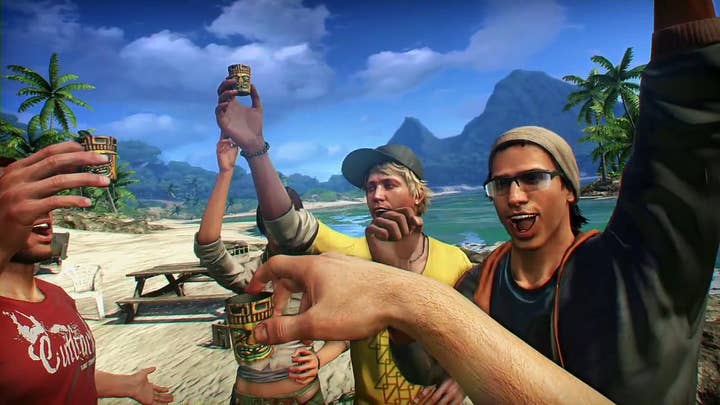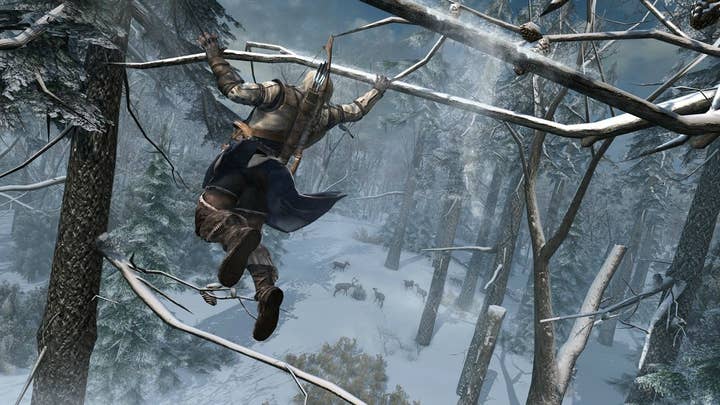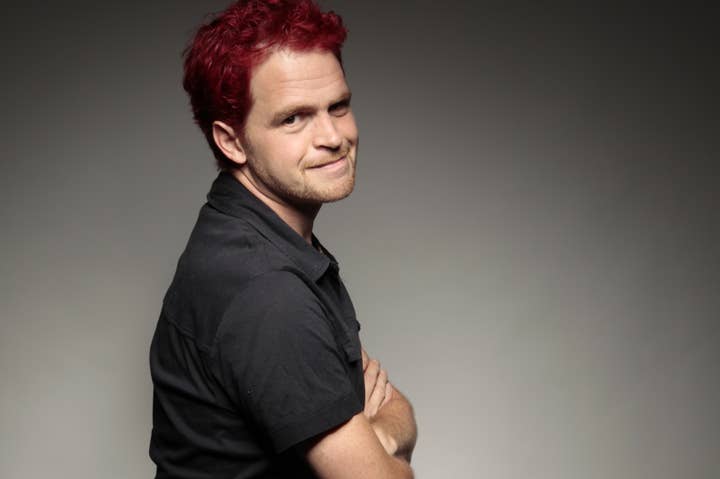The Rabbit Hole: Innovation The Ubisoft Way
Ubisoft's Tommy Francois on Far Cry, Assassin's Creed and the pleasures and perils of creativity
By any measure, 2012 was a fine year for Ubisoft. In addition to its mobile and digital successes, Far Cry 3 and Assassin's Creed are paragons of sequel culture: bold and inventive to an extent that should undermine their commercial objectives, yet hugely successful in the marketplace. The fear that the AAA console industry is forsaking originality for safe bets often feels justified, and last year seemed certain to affirm those concerns. Ubisoft's tent-pole releases didn't dispel those notions on their own, exactly, but they offered much appreciated consolation.
As director of IP development, Ubisoft's Tommy Francois has presided over the company's recent creative achievements. "I think we're proud," he says, grinning. "We're definitely tired.
"An IP is like a rough crystal, and in IP development we polish the facets of these crystals. For some facets that can take years - it's iterative over time - so you want to be sure you're innovating as much as possible. We can't copy and paste in today's world, with how competitive it is and how easy it is to skip from one channel to another. We must be smart, and make our customers feel smart, because then they're emotionally involved with the IP. Innovation is a big part of that."
"We're building Disneyland. We're building a theme park, and each system is an attraction, a subset of rules that you can play with"
Innovation is a slippery ideal: gamers want it, developers strive for it, and yet there's no handy road map or proven formula for success. According to Francois, the notion that new hardware and innovation go hand-in-hand is somewhat misleading. A new console is a great opportunity to launch an original IP from a commercial standpoint, but, for Ubisoft, the creative process is broadly similar regardless of the project or its intended platform.
"If you look at Far Cry 3, a big part of the reason it took us so much time to do the sequel is that we knew that just having something interesting wasn't good enough," he says. "I've always seen Far Cry as the Die Hard of video games: wrong hero, wrong place, wrong time. We started with that, but we felt that was restricting it - we felt we weren't going far enough.
"We wanted people to understand that it wasn't just a shooter, and it wasn't just an action-adventure. It was a hybrid, and a lot of our internal discussion was around how to communicate the gameplay that didn't involve shooting. How do you help people to perceive the rabbit hole?"

Over time, "the rabbit hole" became Far Cry 3's guiding principle. Video games often struggle to give their protagonists personality and depth, particularly games like Far Cry, which grant the player a large degree of freedom and never leave the first-person viewpoint. For Francois, Gordon Freeman and Master Chief may be iconic, but they are largely ciphers, and the same can be said of many classic game heroes. Bucking this trend was a key focus for the Far Cry 3 team, informing every aspect of the game's design.
"It's like Alice going down the rabbit hole," Francois says, referring to one of Far Cry 3's recurring motifs. "You get thrown into an isolated, lawless frontier. It has its own structure, and the foreigner is not welcome because he represents normality. The hero in the traditional sense doesn't really exist, and it's more about the children of the island. They become the heroes. The Vaas character, the Einhardt character; they are important because they become reflections of what you do."
"Some of our franchises may send the message that we're rushing games out, but because the game comes out every year doesn't mean that we only have it in development for a year"
In a recent interview with Rock Paper Shotgun, Far Cry 3's lead writer, Jeffrey Yohalem, spoke about this side of the game, and suggested that many players may have misunderstood what the team was trying to accomplish. In addition to being a game, Far Cry 3 was also a satire about games, and its subtleties were somewhat lost in translation. I suggest to Francois that this is an inevitable pitfall of innovating in a sandbox: the more subtle the brush strokes, the more likely the player will miss them while preoccupied with punching sharks.
"We're building Disneyland. We're building a theme park, and each system is an attraction, a subset of rules that you can play with," he says. "We're creating ecosystems, simulations, emergent gameplay. Each time we do that it becomes much harder for us to control the system, and that's fine. That's why players enjoy it, but open world games need time to mature. There are certain things we can only learn by watching people play our game."
Francois talks about "the perception of innovation." A development team can highlight 30 different aspects of a franchise for reinvention, and half of those new ideas may make it into the finished product, but whether any of that hard work can be considered innovative is reliant to the consent of the audience. In an absolute sense, Assassin's Creed 3 is a more daring sequel than Far Cry 3, a clean break from the structure laid out by its predecessors. However, when it came to feedback from critics and players, Far Cry 3 was more widely regarded as innovative.
According to Francois, this was due in part to the logistics of the Assassin's Creed franchise. When an IP yields a sequel every year, the public can interpret that as a signal that the games are being developed in that same period of time. In a company the size of Ubisoft that's very rarely the case, and short of laying bare its entire inner workings, Francois has very few ways of dispelling that notion.

"Some of our franchises may send the message that we're rushing games out, but people don't realise that because the game comes out every year doesn't mean that we only have it in development for a year," he says. "The multiplayer for Assassin Creed, for example, was in development for years, and we were originally going to use it in another game. But we weren't satisfied with the level of quality, and because we continued working on it for so long it no longer suited that IP and context, but it made perfect sense for Assassin's. These things take time to mature, and at Ubisoft we don't let it go."
Misconceptions like this can be frustrating, but Assassin's Creed 3 highlights another potential problem with innovation. The critics may demand original ideas, and they may temper their review scores when they believe them to be absent, but their eyes are often bigger than their stomachs. According to Francois, familiarity and formula can be every bit as powerful as new concepts. We want a new take on Assassin's Creed, of course, but it might take another sequel or two before we realise that.
"For every sequel that's the big question: how far do we push innovation? Some sequels have been turned into new IP because we pursued that course so far"
"If we had just done another Assassin's Creed game [in the same mould as Brotherhood] I think that critics would have blamed us for that," he says. "It's actually super difficult to know where to put that slider, and if you over-do it... One of my favourite games of all time is Bomberman, and with every new iteration of that game I was always excited, but in the long-run I always go back to the original. I'm sure the guys at Hudson back then tried to innovate, but they broke the heart of what Bomberman meant to me.
"When we went to the north west of America we knew we needed something more organic, so the brand could evolve. Maybe you didn't feel it in this one, but I hope that in one of the upcoming Assassin's games you'll feel that same maturity you felt in Brotherhood. There's a comparison with the first Assassin's game, which wasn't perfect, but without that there would have been no Brotherhood.
"For every sequel that's the big question: how far do we push innovation? Some sequels have been turned into new IP because we pursued that course so far."
With so many interconnected platforms and the ease of digital distribution the opportunities for innovation are more abundant now than ever before, but there will be bumps along the road. The sort of gamers that stand in line for the latest Assassin's Creed game are often suspicious of the attendant DLC, Facebook apps and mobile games, but, looking ahead, Francois believes that these are early experiments in what will soon become an essential part of the AAA experience. Every year, the bar is raised higher and higher, and Ubisoft will be exploring every avenue to ensure its 2013 is as memorable as its 2012.
"We sit there and every Christmas we think, 'My God, we have so much more work to be above that level next year'," Francois says. "It was a lot of work for the whole company, and we're very conscious of that. We were successful and we don't want that to disappear.
"We're working hard to try and maintain that, but it's almost like fighting a ghost."

